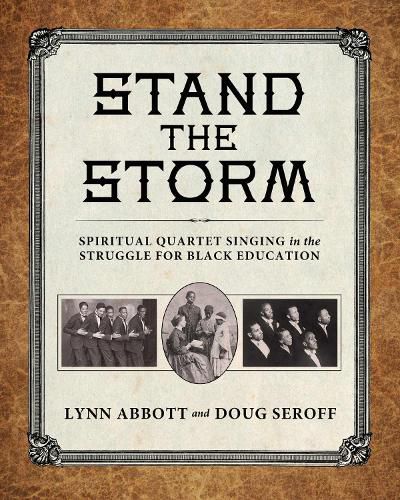Readings Newsletter
Become a Readings Member to make your shopping experience even easier.
Sign in or sign up for free!
You’re not far away from qualifying for FREE standard shipping within Australia
You’ve qualified for FREE standard shipping within Australia
The cart is loading…






Black education in the South was the great social program of the post-Civil War era. Desperately strapped for operating capital, the first freedmen's schools resorted to a bold fundraising experiment. Student troupes were sent to the North singing Negro spirituals, the sacred songs of slavery, in order to generate goodwill and entice financial support. The Fisk University Jubilee Singers set this strategy in motion in 1871; in the wake of their success, it was adopted by HBCUs throughout the Southland. Intrepid student singers introduced the outside world to the Negro spirituals, the "genuine jewels" they brought from their bondage, and "sang up" school buildings in the process. Negro spiritual singing was a revelation for the northern public; it was their initial exposure to an emergent, distinctly American kind of creative energy. Male quartets became the standard-bearers of this venerable Black music tradition.
In Stand the Storm: Spiritual Quartet Singing in the Struggle for Black Education, award-winning authors Lynn Abbott and Doug Seroff dive into the history of three generations of fundraising quartets from seven representative schools: Fisk, Hampton, Tuskegee, Penn, Calhoun, Utica, and Piney Woods. They acknowledge the heroic founders of the schools and restore the names of forgotten singers to the historical record. They reevaluate the industrial education model that guided these schools. Finally, they plot the evolution of Negro spiritual singing after Emancipation by scrutinizing early published song collections and comparing them with songbooks and recordings from subsequent eras.
$9.00 standard shipping within Australia
FREE standard shipping within Australia for orders over $100.00
Express & International shipping calculated at checkout
Black education in the South was the great social program of the post-Civil War era. Desperately strapped for operating capital, the first freedmen's schools resorted to a bold fundraising experiment. Student troupes were sent to the North singing Negro spirituals, the sacred songs of slavery, in order to generate goodwill and entice financial support. The Fisk University Jubilee Singers set this strategy in motion in 1871; in the wake of their success, it was adopted by HBCUs throughout the Southland. Intrepid student singers introduced the outside world to the Negro spirituals, the "genuine jewels" they brought from their bondage, and "sang up" school buildings in the process. Negro spiritual singing was a revelation for the northern public; it was their initial exposure to an emergent, distinctly American kind of creative energy. Male quartets became the standard-bearers of this venerable Black music tradition.
In Stand the Storm: Spiritual Quartet Singing in the Struggle for Black Education, award-winning authors Lynn Abbott and Doug Seroff dive into the history of three generations of fundraising quartets from seven representative schools: Fisk, Hampton, Tuskegee, Penn, Calhoun, Utica, and Piney Woods. They acknowledge the heroic founders of the schools and restore the names of forgotten singers to the historical record. They reevaluate the industrial education model that guided these schools. Finally, they plot the evolution of Negro spiritual singing after Emancipation by scrutinizing early published song collections and comparing them with songbooks and recordings from subsequent eras.